Resume
ICU Nurse Cover Letter Examples

May 29, 2025
|
12 min read
Land your dream job by learning how to write a compelling ICU nurse cover letter. This guide stitches together essential tips, helping you convey your passion and dedication, making your application stand out in the critical care field.
4.70 Average rating
Rated by 348 people
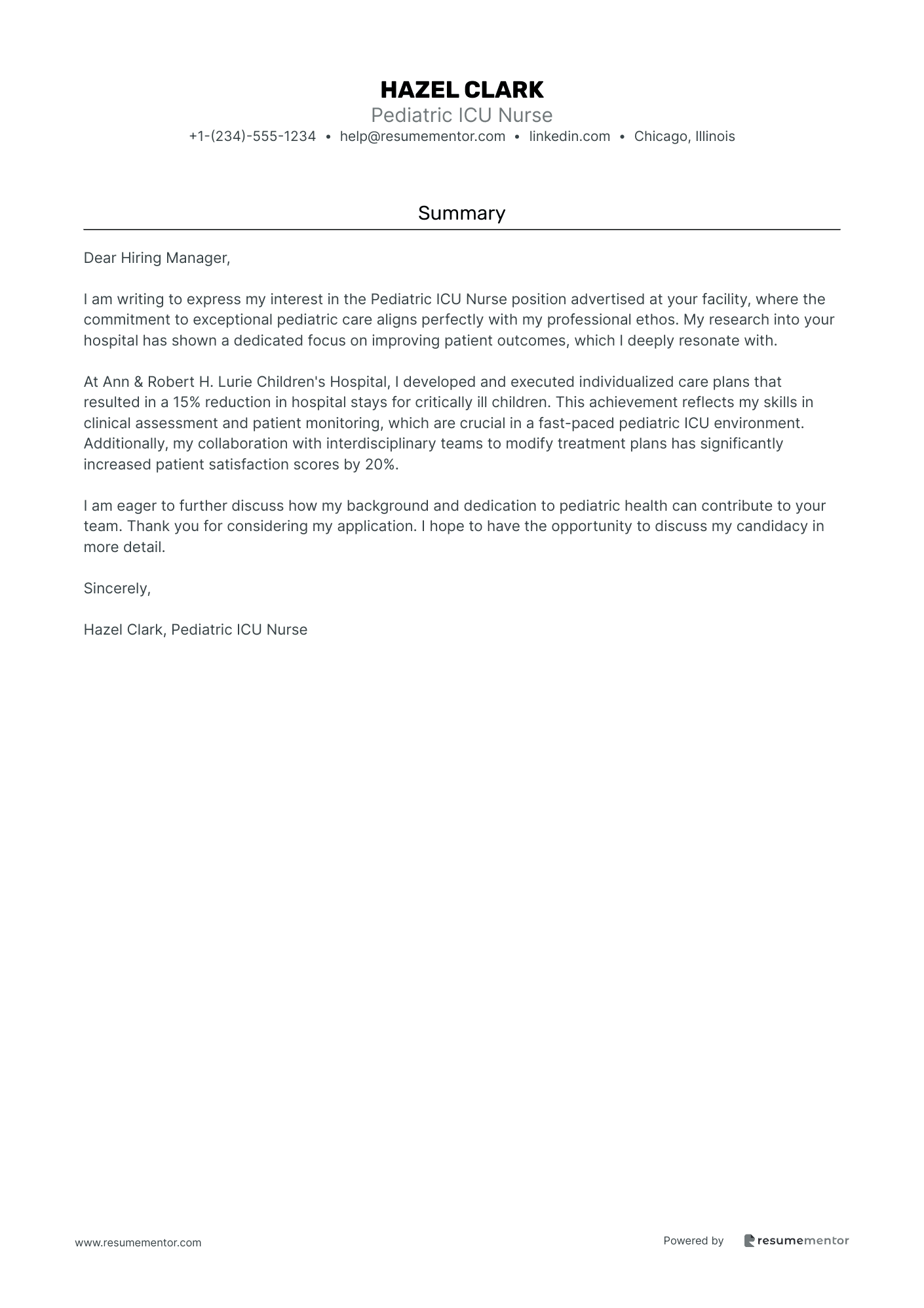
Pediatric ICU Nurse
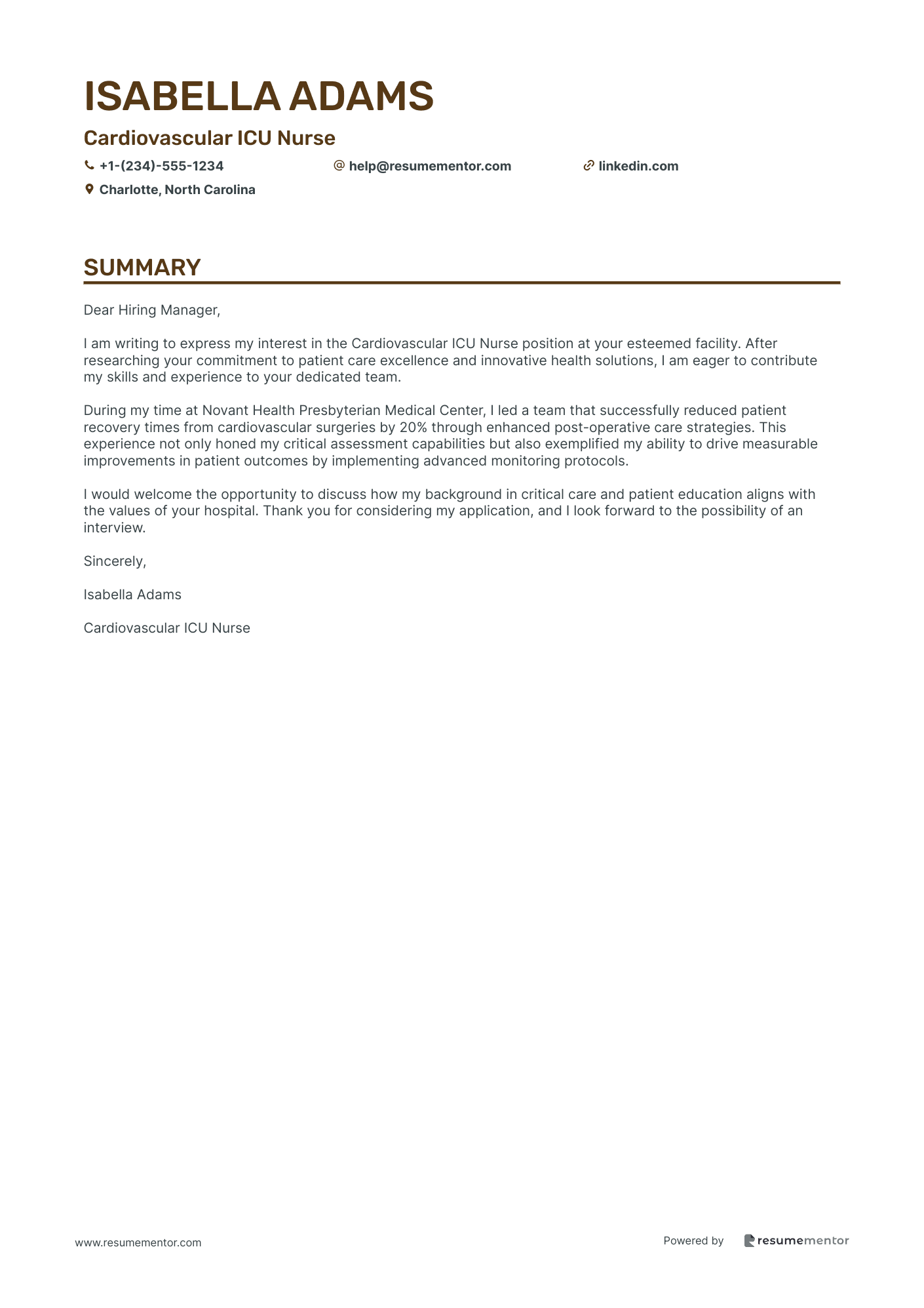
Cardiovascular ICU Nurse
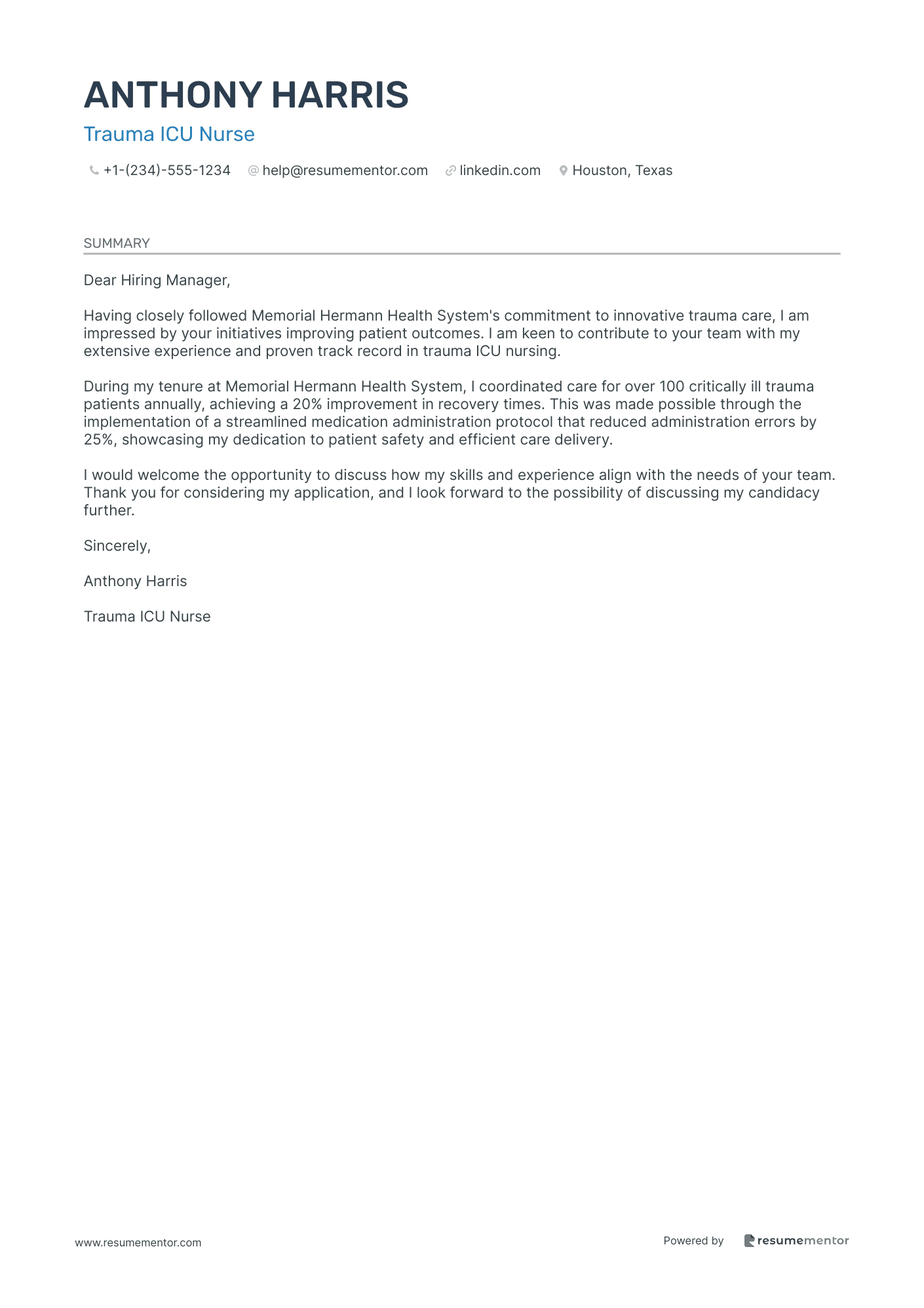
Trauma ICU Nurse
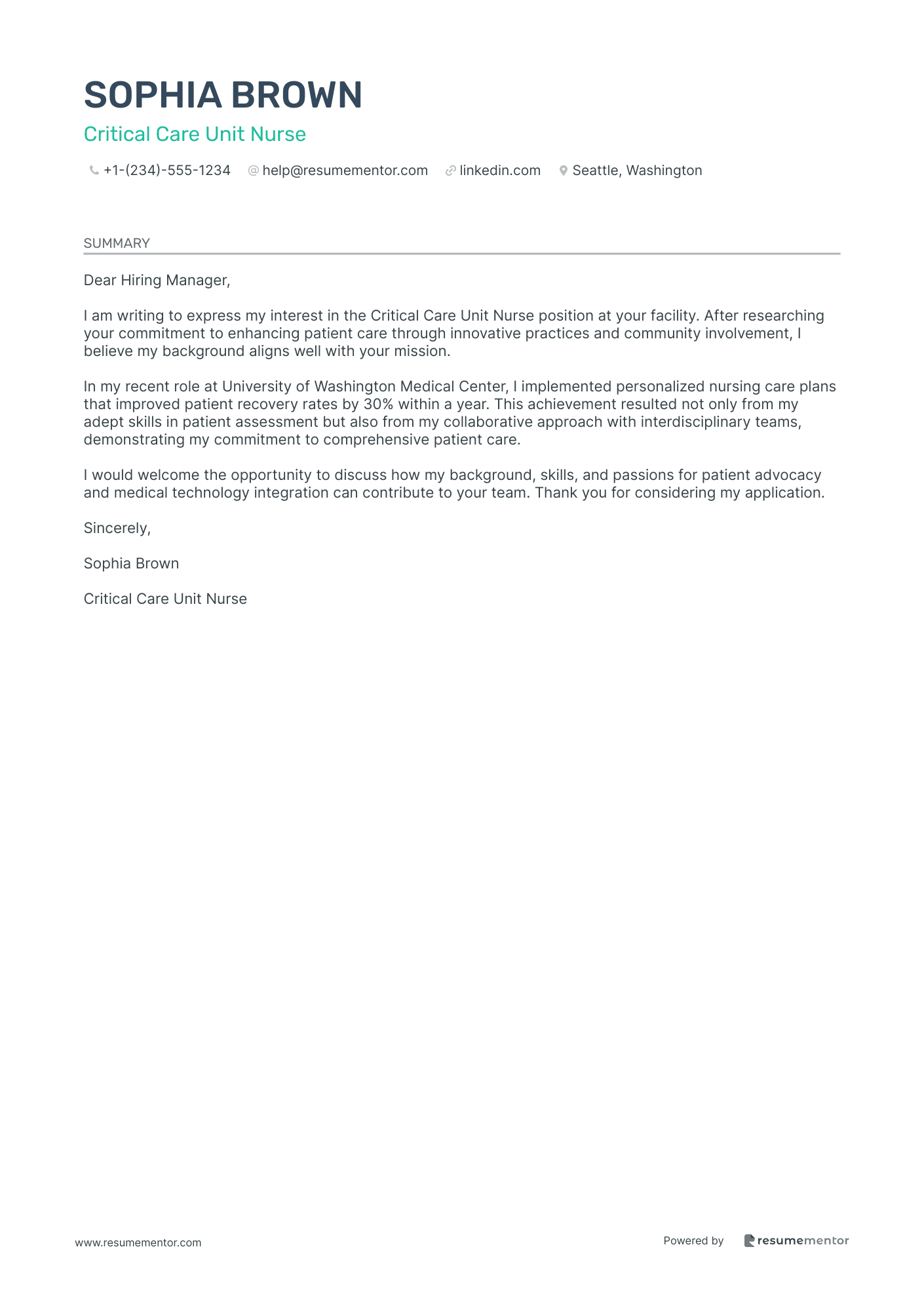
Critical Care Unit Nurse
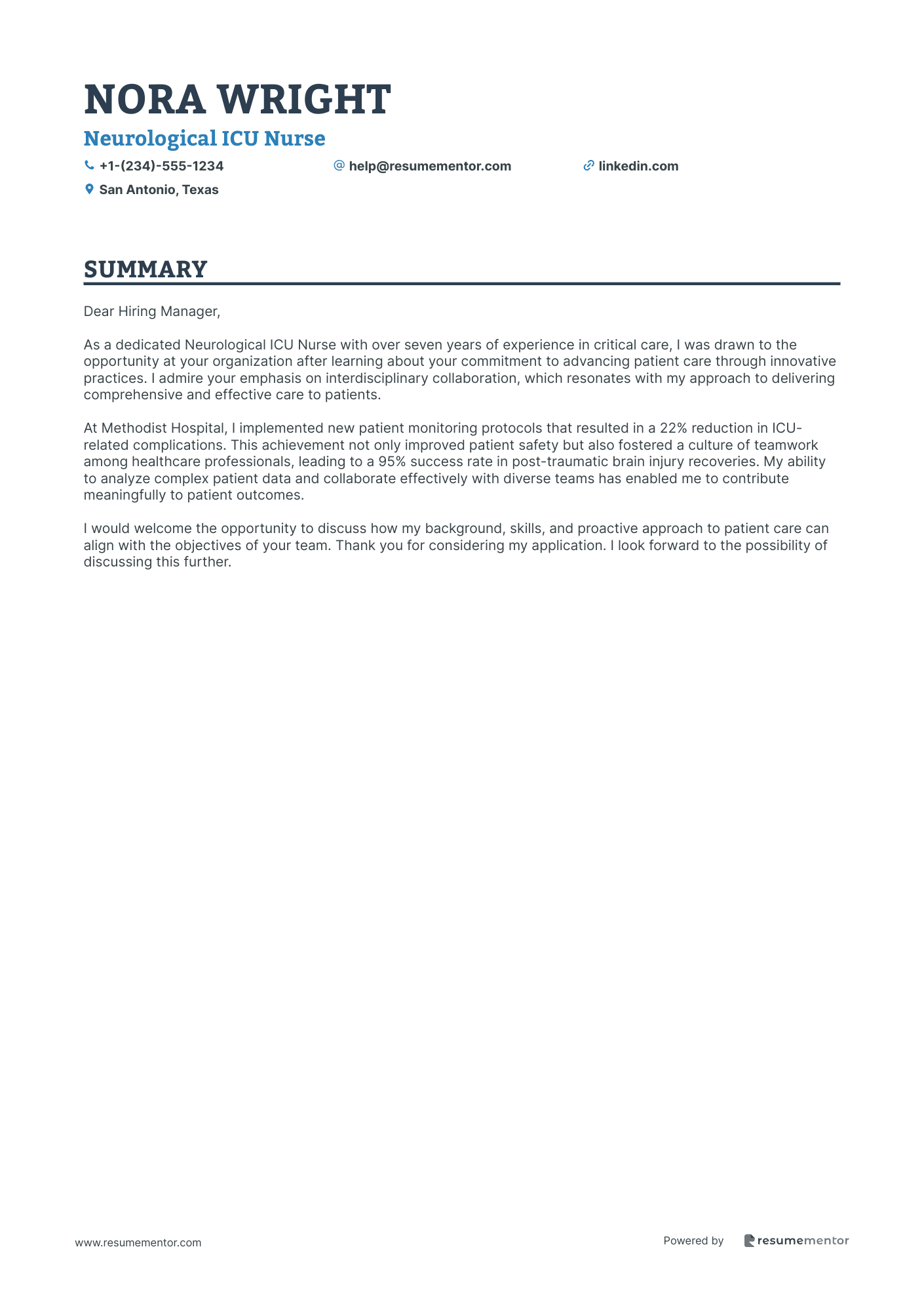
Neurological ICU Nurse
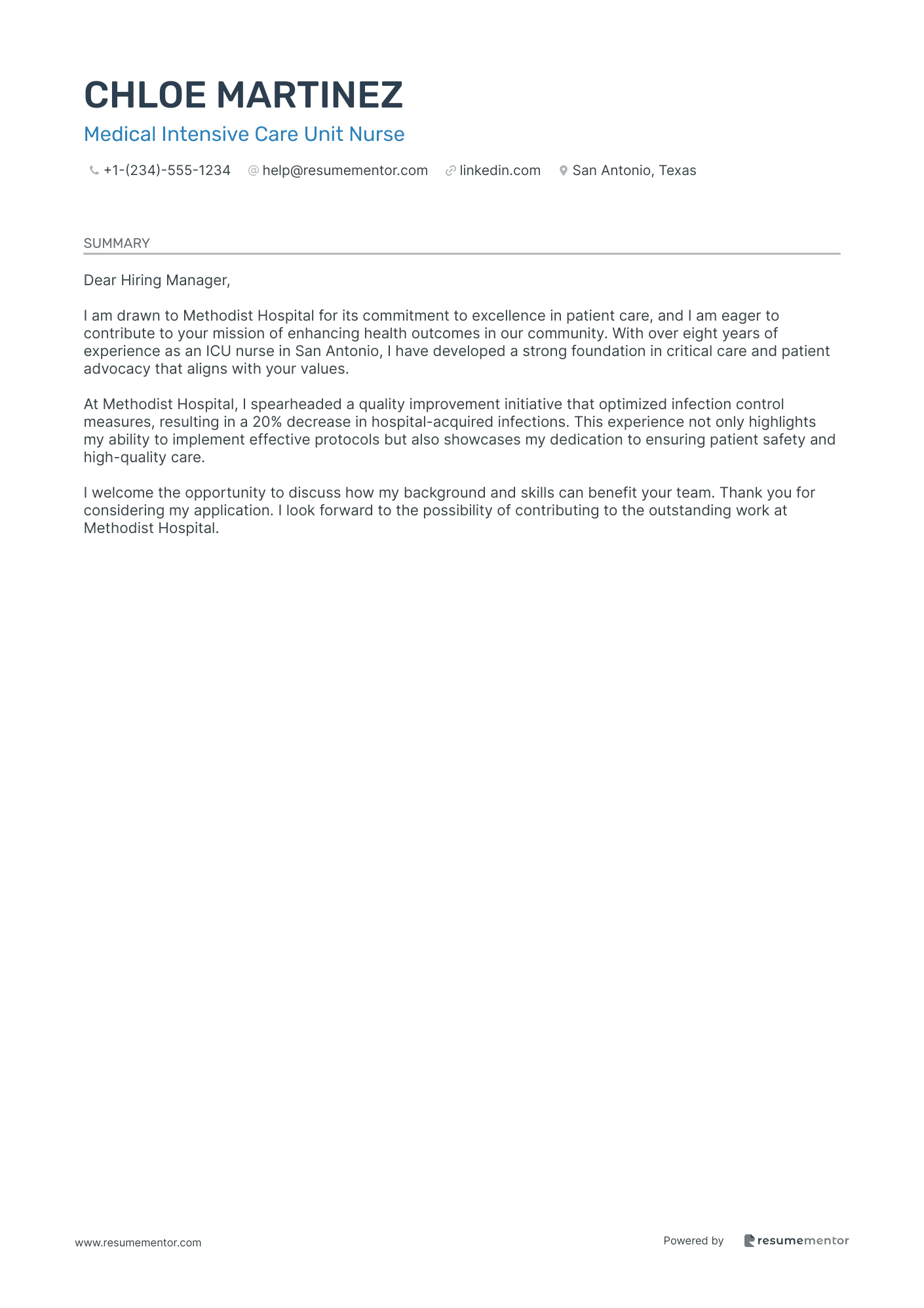
Medical Intensive Care Unit Nurse
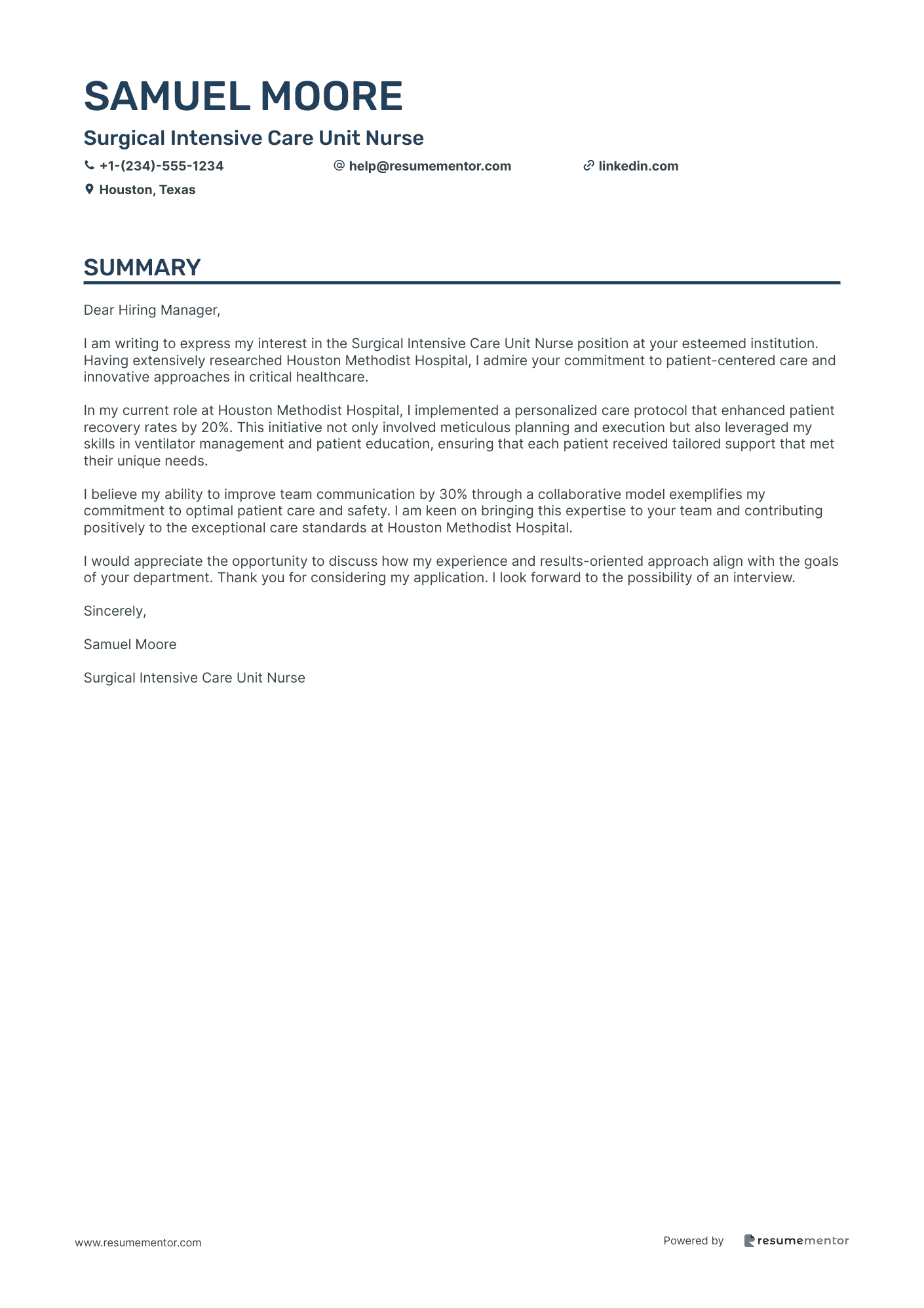
Surgical Intensive Care Unit Nurse
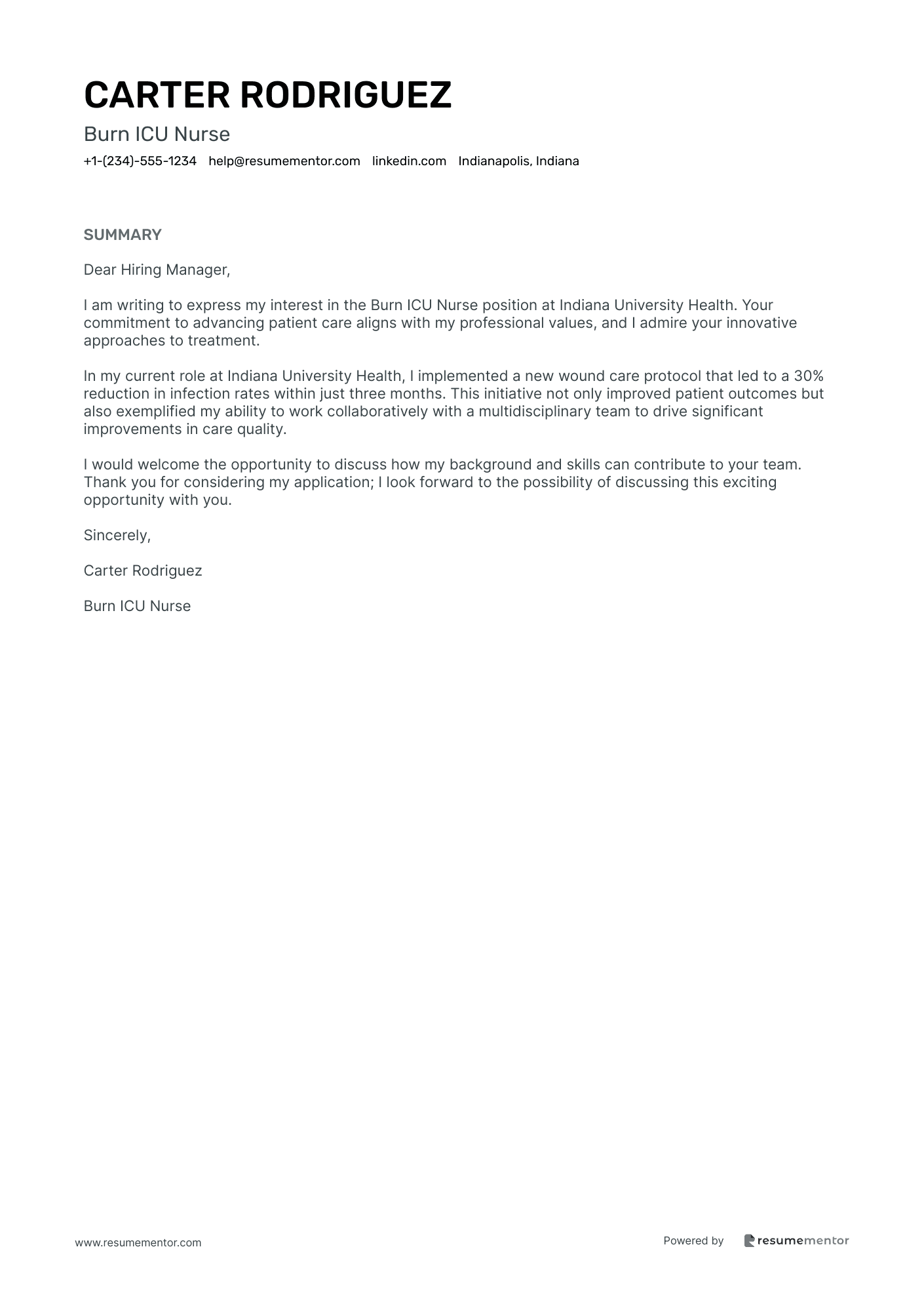
Burn ICU Nurse
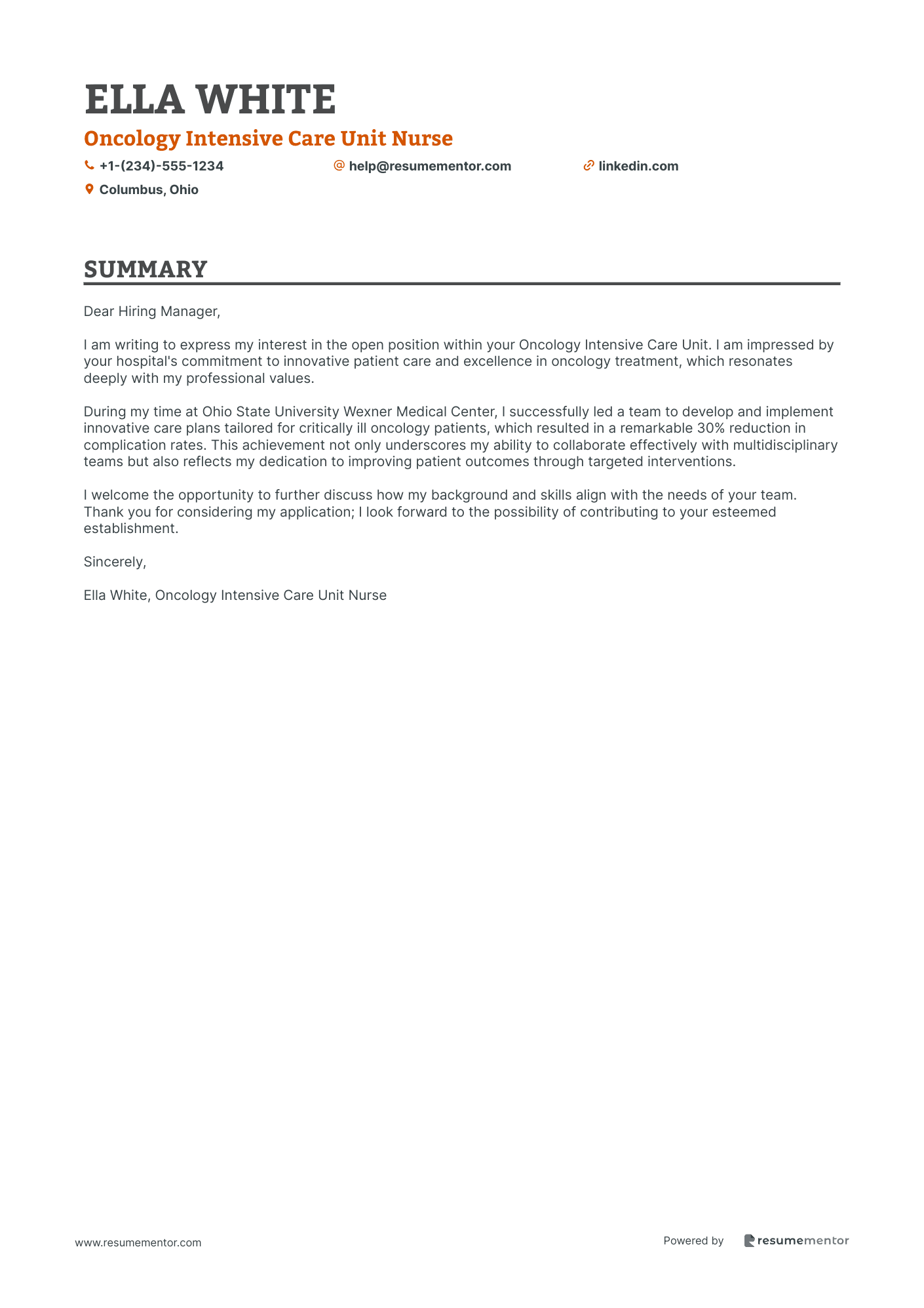
Oncology Intensive Care Unit Nurse

Pediatric ICU Nurse cover letter sample
When applying for this role, it is essential to emphasize any previous experience in pediatric care or critical care settings. Highlight your skills in patient assessment and emergency response, as these are crucial. If you have completed relevant certifications, such as Pediatric Advanced Life Support (PALS) or Neonatal Resuscitation Program (NRP), mention these. Include specific instances where your interventions improved patient outcomes, following a clear 'skill-action-result' format. Demonstrating teamwork and communication with families will also strengthen your application significantly.
Summary
Dear Hiring Manager,
I am writing to express my interest in the Pediatric ICU Nurse position advertised at your facility, where the commitment to exceptional pediatric care aligns perfectly with my professional ethos. My research into your hospital has shown a dedicated focus on improving patient outcomes, which I deeply resonate with.
At Ann & Robert H. Lurie Children's Hospital, I developed and executed individualized care plans that resulted in a 15% reduction in hospital stays for critically ill children. This achievement reflects my skills in clinical assessment and patient monitoring, which are crucial in a fast-paced pediatric ICU environment. Additionally, my collaboration with interdisciplinary teams to modify treatment plans has significantly increased patient satisfaction scores by 20%.
I am eager to further discuss how my background and dedication to pediatric health can contribute to your team. Thank you for considering my application. I hope to have the opportunity to discuss my candidacy in more detail.
Sincerely,
Hazel Clark, Pediatric ICU Nurse
Cardiovascular ICU Nurse cover letter sample
When applying for this role, emphasize any relevant clinical experience in critical care or cardiac settings. Showcase your ability to monitor patient vital signs and respond to emergencies effectively. Familiarity with advanced equipment such as ventilators and cardiac monitors is essential. Highlight certifications like ACLS or BLS to demonstrate your commitment to patient safety. Provide specific examples of successful interventions or patient outcomes, using the 'skill-action-result' framework to illustrate your impact on patient care and team collaboration.
Isabella Adams
Cardiovascular ICU Nurse
Summary
Dear Hiring Manager,
I am writing to express my interest in the Cardiovascular ICU Nurse position at your esteemed facility. After researching your commitment to patient care excellence and innovative health solutions, I am eager to contribute my skills and experience to your dedicated team.
During my time at Novant Health Presbyterian Medical Center, I led a team that successfully reduced patient recovery times from cardiovascular surgeries by 20% through enhanced post-operative care strategies. This experience not only honed my critical assessment capabilities but also exemplified my ability to drive measurable improvements in patient outcomes by implementing advanced monitoring protocols.
I would welcome the opportunity to discuss how my background in critical care and patient education aligns with the values of your hospital. Thank you for considering my application, and I look forward to the possibility of an interview.
Sincerely,
Isabella Adams
Cardiovascular ICU Nurse
Trauma ICU Nurse cover letter sample
When applying for this role, it’s important to highlight any experience in critical care or trauma settings. Mention your familiarity with advanced life support techniques and monitoring equipment. Certifications, such as ACLS or PALS, should be included to demonstrate your qualifications. Share specific instances where you provided exceptional patient care in high-pressure situations. Focus on your ability to work effectively in a team, showing how your collaboration improved patient outcomes. Use examples that follow a 'skill-action-result' format to illustrate your impact in previous roles.
Summary
Dear Hiring Manager,
Having closely followed Memorial Hermann Health System's commitment to innovative trauma care, I am impressed by your initiatives improving patient outcomes. I am keen to contribute to your team with my extensive experience and proven track record in trauma ICU nursing.
During my tenure at Memorial Hermann Health System, I coordinated care for over 100 critically ill trauma patients annually, achieving a 20% improvement in recovery times. This was made possible through the implementation of a streamlined medication administration protocol that reduced administration errors by 25%, showcasing my dedication to patient safety and efficient care delivery.
I would welcome the opportunity to discuss how my skills and experience align with the needs of your team. Thank you for considering my application, and I look forward to the possibility of discussing my candidacy further.
Sincerely,
Anthony Harris
Trauma ICU Nurse
Critical Care Unit Nurse cover letter sample
When applying for this position, emphasize your clinical experience in acute care settings. Highlight your ability to work under pressure and manage complex patient needs. Include certifications such as Advanced Cardiac Life Support (ACLS) or Critical Care Nursing certifications to showcase your commitment to continuous education. Mention times when your quick decision-making improved patient outcomes. Demonstrating your teamwork with interdisciplinary teams can show your collaborative skills. Be sure to share specific examples where your interventions led to successful recoveries, following the 'skill-action-result' format for clarity.
Sophia Brown
Critical Care Unit Nurse
Summary
Dear Hiring Manager,
I am writing to express my interest in the Critical Care Unit Nurse position at your facility. After researching your commitment to enhancing patient care through innovative practices and community involvement, I believe my background aligns well with your mission.
In my recent role at University of Washington Medical Center, I implemented personalized nursing care plans that improved patient recovery rates by 30% within a year. This achievement resulted not only from my adept skills in patient assessment but also from my collaborative approach with interdisciplinary teams, demonstrating my commitment to comprehensive patient care.
I would welcome the opportunity to discuss how my background, skills, and passions for patient advocacy and medical technology integration can contribute to your team. Thank you for considering my application.
Sincerely,
Sophia Brown
Critical Care Unit Nurse
Neurological ICU Nurse cover letter sample
When crafting your cover letter, it's essential to highlight any experience in critical care settings. Emphasize your proficiency in monitoring neurological patients and managing specific treatments, such as telemetry or ICP monitoring. Certifications like ACLS or CCRN should be showcased to validate your skills. Provide examples of how your clinical judgment has led to positive patient outcomes, using the 'skill-action-result' framework. This approach demonstrates your ability to handle high-pressure situations effectively and reassures employers of your commitment to quality care.
Nora Wright
Neurological ICU Nurse
Summary
Dear Hiring Manager,
As a dedicated Neurological ICU Nurse with over seven years of experience in critical care, I was drawn to the opportunity at your organization after learning about your commitment to advancing patient care through innovative practices. I admire your emphasis on interdisciplinary collaboration, which resonates with my approach to delivering comprehensive and effective care to patients.
At Methodist Hospital, I implemented new patient monitoring protocols that resulted in a 22% reduction in ICU-related complications. This achievement not only improved patient safety but also fostered a culture of teamwork among healthcare professionals, leading to a 95% success rate in post-traumatic brain injury recoveries. My ability to analyze complex patient data and collaborate effectively with diverse teams has enabled me to contribute meaningfully to patient outcomes.
I would welcome the opportunity to discuss how my background, skills, and proactive approach to patient care can align with the objectives of your team. Thank you for considering my application. I look forward to the possibility of discussing this further.
Medical Intensive Care Unit Nurse cover letter sample
When applying for this role, it’s essential to highlight your clinical experience in critical care settings. Showcase any advanced certifications, such as ACLS or PALS, to demonstrate your commitment to the field. Strong assessment and problem-solving skills are crucial, so provide examples of how you've managed complex patient cases. Additionally, include any relevant training in new technology or equipment. Mention teamwork and collaboration with interdisciplinary teams, as these experiences show your ability to provide comprehensive patient care and improve outcomes.
Chloe Martinez
Medical Intensive Care Unit Nurse
Summary
Dear Hiring Manager,
I am drawn to Methodist Hospital for its commitment to excellence in patient care, and I am eager to contribute to your mission of enhancing health outcomes in our community. With over eight years of experience as an ICU nurse in San Antonio, I have developed a strong foundation in critical care and patient advocacy that aligns with your values.
At Methodist Hospital, I spearheaded a quality improvement initiative that optimized infection control measures, resulting in a 20% decrease in hospital-acquired infections. This experience not only highlights my ability to implement effective protocols but also showcases my dedication to ensuring patient safety and high-quality care.
I welcome the opportunity to discuss how my background and skills can benefit your team. Thank you for considering my application. I look forward to the possibility of contributing to the outstanding work at Methodist Hospital.
Surgical Intensive Care Unit Nurse cover letter sample
When applying for this specialized role, it’s essential to emphasize any hands-on clinical experience you have in critical care settings. Highlight your proficiency with advanced monitoring equipment and your understanding of complex medical conditions. Showcase your certifications, such as ACLS or CCRN, to demonstrate your commitment to ongoing education. Provide examples of how your quick decision-making and teamwork in high-pressure situations have improved patient outcomes. Use the 'situation-action-result' format to articulate your contributions effectively and demonstrate your impact on patient care and team dynamics.
Samuel Moore
Surgical Intensive Care Unit Nurse
Summary
Dear Hiring Manager,
I am writing to express my interest in the Surgical Intensive Care Unit Nurse position at your esteemed institution. Having extensively researched Houston Methodist Hospital, I admire your commitment to patient-centered care and innovative approaches in critical healthcare.
In my current role at Houston Methodist Hospital, I implemented a personalized care protocol that enhanced patient recovery rates by 20%. This initiative not only involved meticulous planning and execution but also leveraged my skills in ventilator management and patient education, ensuring that each patient received tailored support that met their unique needs.
I believe my ability to improve team communication by 30% through a collaborative model exemplifies my commitment to optimal patient care and safety. I am keen on bringing this expertise to your team and contributing positively to the exceptional care standards at Houston Methodist Hospital.
I would appreciate the opportunity to discuss how my experience and results-oriented approach align with the goals of your department. Thank you for considering my application. I look forward to the possibility of an interview.
Sincerely,
Samuel Moore
Surgical Intensive Care Unit Nurse
Burn ICU Nurse cover letter sample
When applying for this role, it's essential to highlight your experience in critical care. Showcase your ability to manage diverse patient needs, particularly in high-pressure situations. If you've completed specialized training in burn care or trauma management, be sure to mention these qualifications and their duration. Provide examples of how you’ve implemented pain management strategies or improved patient recovery times. Use a 'skill-action-result' format to clearly demonstrate how your clinical skills have positively impacted patient outcomes and enhanced team effectiveness in previous roles.
Carter Rodriguez
Burn ICU Nurse
Summary
Dear Hiring Manager,
I am writing to express my interest in the Burn ICU Nurse position at Indiana University Health. Your commitment to advancing patient care aligns with my professional values, and I admire your innovative approaches to treatment.
In my current role at Indiana University Health, I implemented a new wound care protocol that led to a 30% reduction in infection rates within just three months. This initiative not only improved patient outcomes but also exemplified my ability to work collaboratively with a multidisciplinary team to drive significant improvements in care quality.
I would welcome the opportunity to discuss how my background and skills can contribute to your team. Thank you for considering my application; I look forward to the possibility of discussing this exciting opportunity with you.
Sincerely,
Carter Rodriguez
Burn ICU Nurse
Oncology Intensive Care Unit Nurse cover letter sample
When applying for this position, prioritize showcasing your clinical experience in critical care settings. Highlight any specific training in oncology or related fields, such as certifications in chemotherapy administration. Emphasize your ability to manage complex patient needs and monitor vital signs effectively. Provide examples of how you improved patient outcomes through your interventions. Detail your teamwork and communication skills, particularly in high-stress situations. Use a 'skill-action-result' format to illustrate how your actions directly benefitted patient care and collaboration among healthcare teams.
Ella White
Oncology Intensive Care Unit Nurse
Summary
Dear Hiring Manager,
I am writing to express my interest in the open position within your Oncology Intensive Care Unit. I am impressed by your hospital's commitment to innovative patient care and excellence in oncology treatment, which resonates deeply with my professional values.
During my time at Ohio State University Wexner Medical Center, I successfully led a team to develop and implement innovative care plans tailored for critically ill oncology patients, which resulted in a remarkable 30% reduction in complication rates. This achievement not only underscores my ability to collaborate effectively with multidisciplinary teams but also reflects my dedication to improving patient outcomes through targeted interventions.
I welcome the opportunity to further discuss how my background and skills align with the needs of your team. Thank you for considering my application; I look forward to the possibility of contributing to your esteemed establishment.
Sincerely,
Ella White, Oncology Intensive Care Unit Nurse
Related Articles

Continue Reading
Check more recommended readings to get the job of your dreams.
Resume
Resources
Tools
© 2026. All rights reserved.
Made with love by people who care.
